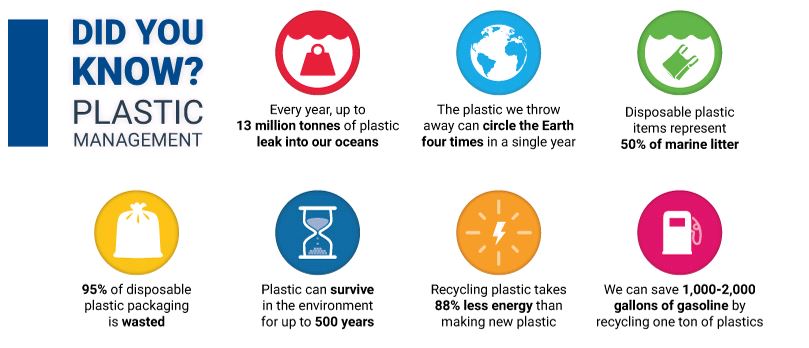Plastic has become a fundamental part of our lives. Its pervasive nature means it can be found in everything from shopping bags to cosmetics, clothing, toys, packaging and food.
Yes, food. Even fish and shellfish now contain varying levels of microplastics as a result of plastic pollution in the oceans. Makes you think twice about that smoked salmon bagel, doesn’t it? Speaking of fish, there’s a prediction that by 2050, we’ll have more plastic in the sea than fish, so it’s imperative that we take this issue seriously.
Plastic is everywhere, and because it can take hundreds of years to break down, it’s here to stay. Governments and corporations are finally starting work to stop this massive problem from reaching the point of disaster, although as individuals, there are some powerful steps we can also take in actioning change.

If you can’t use it, refuse it
The theme for the United Nation’s (UN) World Environment Day 2018 was #BeatPlasticPollution – “If you can’t reuse it, refuse it”.
Slowly but surely, momentum is building as governments, industries, communities and individuals around the world respond to the call to discontinue the use of single-use, lightweight plastic.
The introduction of a law in July 2018 made it illegal for Australian retailers to sell or supply lightweight (less than 35 microns), single-use plastic bags in every state except NSW. Retail giants Coles and Woolworths have pledged to reduce plastic use for fresh foods, and other companies have replaced plastic bags with sustainable options.
Further encouraging action includes the International Olympic Committee announcing their intention to eradicate single-use plastics from the organisation and its events around the world.
After many years of escalating concern over the environmental impacts of plastic pollution, such actions are a welcome development and a reflection of the change in attitudes toward sustainability.
All of these moves are important for the future of our planet, but what can we do as individuals to contribute to the change? Is there a limit to our own impact on the plastic problem?
Things we can do to reduce plastic waste
- Switch to biodegradable or reusable bags.
One report suggests that if each person in Australia swaps to renewable shopping bags, we could divert 2,200 truckloads of plastic from landfill each year. That’s a huge number! For those who rely on disposable bags for rubbish, consider a non-plastic biodegradable option. - Buy recycled plastics
It’s surprising how many environmentally-friendly alternatives there are available. Everyday office products such as staplers, bins, binders, pens and even bubble wrap can be made from recycled plastic. At present, only 14% of plastics are recovered for recycling. With a simple choice to purchase recycled plastics, we can increase that percentage. - Invest in a reusable coffee cup
If you love grabbing a morning coffee on the way to work, ask your barrister to fill your personal cup and avoid plastic cups and lids. It’s cheaper for them and better for the environment. Win-win! - Cater with eco-friendly party supplies
The convenience of disposable cups, plates and cutlery is just too tempting when it comes to large events. Eco-friendly options are available though, and they’re much kinder to the environment, so you can still get away without having to do the dishes. - Make your voice and choice heard
By purchasing food with no plastic packaging, refusing straws in our fizzy drinks and taking our own bags to the shops, we can have a large impact by way of supply and demand. Support environmentally-ethical companies who take a strong stance on sustainability and put your money towards a healthier future for the planet.
It’s also worth contacting government representatives and organisations to voice your concern over industrial practices – as they affect all of us. For example, the amount of plastic waste from commercial fisheries is disproportionately large compared to straws and other consumer plastics. It might be beyond our immediate control, but we can still speak up when it matters.
Saving the world one item at a time
There’s a well-known story about a boy standing at the beach, returning a starfish to the ocean that had been washed up by the tide in a storm. An older man nearby observed that there were hundreds of starfish along the shore and told the young boy that he’d never be able to save them all. The young boy smiled as he held a helpless starfish in his hand and said, “I can save this one!”
The plastic problem might appear as overwhelming as starfish on the beach, although in all likelihood, it’s more likely to be plastic pollution that washes up now. What’s important is that we realise, as consumers, that our choices really do make a difference to the environment.
Research from the UN Environment says the problem isn’t plastic, but rather what we do with it. They explain, “We’ve become over reliant on single-use or disposable plastic. We buy one million plastic drinking bottles every minute and use roughly 500 billion disposable plastic bags every year. In total, some 50% of plastic is single use.”
Small daily changes such as purchasing fruit and vegetables which are free of plastic wrap, or choosing an item made from recycled plastic rather than new will eventually reduce the demand for new plastic production, as well as lessening the amount of landfill and ocean pollution.
No products were found with the applied settings

